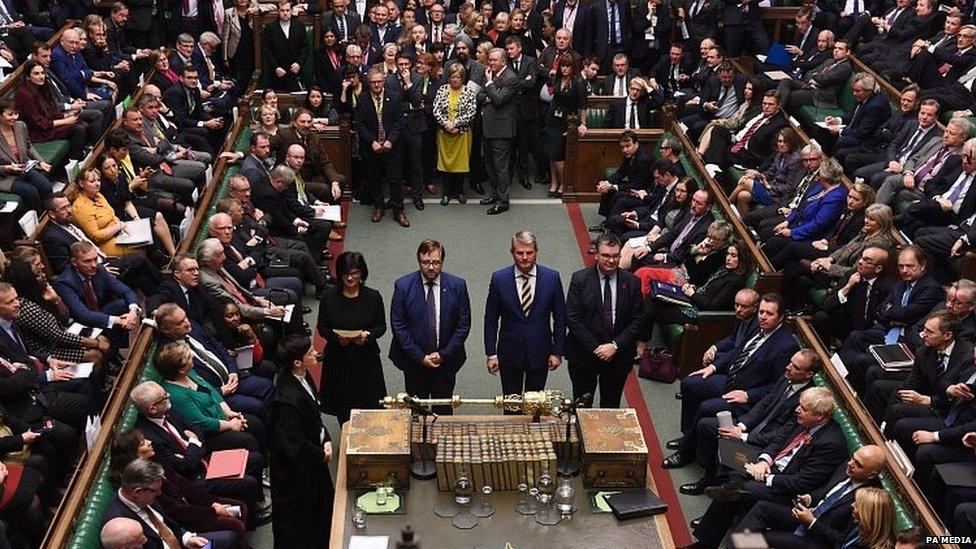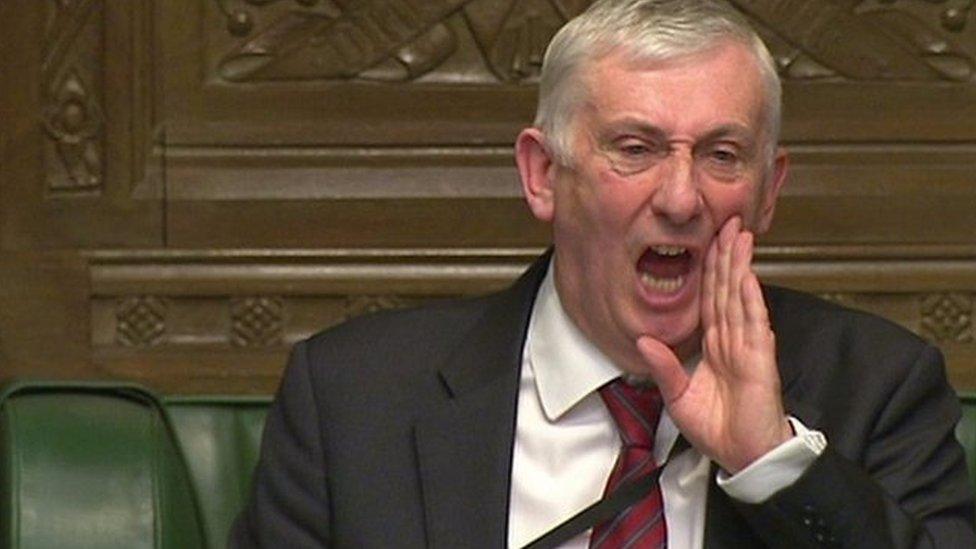Speaker's election: What those hoping to succeed Bercow will need to do to win
- Published

The next Speaker will have to win support from across party lines
On Monday what one MP calls "the most duplicitous electorate in the world" will vote to choose a new Speaker of the House of Commons.
It may be an easy win, or it might be an intricate tactical battle - with eight declared candidates in the field, almost anything could happen.
The process begins in the morning when the candidates must hand in their nominations by 10:30 GMT.
They must be signed by 12 to 15 MPs, at least three of whom must come from a different party to the person they are nominating.
The first thing to look out for is who is nominating who - certain big names could swing votes behind particular candidates, although it is always the kiss of death for the prime minister of the day to indicate support for a candidate - MPs don't want a creature of the government in the Chair.
At 14:30 the House will convene in the Chamber, with the Father of the House Ken Clarke in the Chair. The candidates will make their pitch to MPs in a five-minute speech in an order determined by drawing lots.
Voting process
Then the voting starts. MPs will have 20 minutes to cast their votes, and it will then take about an hour to count them. If someone wins outright, then the motion will be put that they take the Chair, without further ado….
If not, the candidate who received the fewest votes is eliminated, along with any other candidate who polled less than 5% of the total. There's also a chance for those who didn't do as well as expected to pull out voluntarily.
And in a multi-candidate election this is where the game-playing starts.
The initial result might release quite a few people to vote a different way next time - and even those candidates who survive this first hurdle may find themselves being written off for the next round, with their supporters jumping ship to others.
Some MPs will cast their first vote for an old friend or a tribal candidate, in the knowledge that they will not succeed - so the question for the bigger candidates is how they can become the second preference for MPs whose first choice is either eliminated, or looks hopeless.
Much of the behind-the-scenes campaigning will have been focused on this group - "we know you and Fred have been mates since the Wilson years, but our candidate agrees with you about [insert issue here]."
Change in style?
So what might MPs want? First there seems be an appetite for a different style - an end to Bercow-esque grandiloquence and those five-minute appeals for brevity, as well as for an end to the kind of clashes with MPs that the departed Speaker was prone to:
Remember his red-faced finger-jabbing clash with the then Chief Whip Patrick McLoughlin, or this week's spat with long-time Bercow critic Andrew Bridgen?
Then there's the much more important concern about the Speaker's sweeping powers to make the rules in the Commons, a power which saw him permitting amendments to Business of the House motions which were supposed to be taken "forthwith" - which many MPs believed meant they could not be amended.

Sir Lindsay Hoyle, one of John Bercow's deputies, is the favourite to succeed him
Or those amendable emergency motions which were used to allow a backbench alliance to take control of the Order Paper and promote legislation in the teeth of resistance by the government.
They allowed a Commons majority to find its voice, but many suspected the Speaker was prepared to innovate because he was a Remainer. Some MPs may want an equally innovative Speaker who continues to empower backbenchers; others may feel there's been enough innovation for now, and that it's time for normal service to be resumed.
Different candidates will seek to appeal to these different interest groups. And they will also need to be able to appeal across parties.
Reaching out
Given no one party has a majority in the House, the winning candidate will be the one most capable of reaching across party lines, and building a majority out of factions of the main parties, the members of the smaller parties and their personal supporters.
Those seen as party gladiators first and foremost may find that hard to do.
Momentum may matter a lot - a candidate who polls unexpectedly well in the early ballots will sip the vital elixir of credibility and begin to attract waverers to their standard.
Most observers think the current senior deputy speaker, Sir Lindsay Hoyle, is the frontrunner.
As Chairman of Ways and Means, he chairs budget debates and selects amendments for committee stage proceedings on bills, and has had plenty of opportunity to demonstrate his credentials.
He's also the liaison for MPs with concerns about their security and that of their family or staff, which has become an ever-more important issue in the current poisonous political climate.
My guess is that the contest will boil down to a Hoyle vs a non-Hoyle candidate, or to put it another way the ballots will be a way to identify if there is a viable challenger to him.
There may not be. Only if there is a candidate capable of attracting second, third and fourth preference votes faster than Sir Lindsay, will the contest be close.
